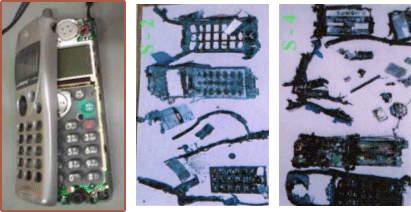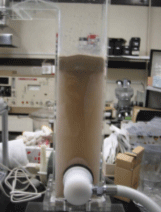 |
 |
|
|||||||||||||||||||||||||
|
| Resource Processing Engineering: Technology for Recycling & Better Environment | ||
Toyohisa Fujita, Prof., Department of Geosystem Engineering, School of Engineering For sustainable society, it is required that we should recycle the resources, which their amount is limited, and use them efficiently. Within this frame, based on my area of expertise that is the resource processing engineering, I have been involved in developing technology in order to recycle the resource, saving the energy, and in turn contributing for a better environment. There are a number of method for better environment that can be pointed out. |
||
Removal of insoluble chlorine from bottom ash for recycling. In other words, the method that is able to remove chlorine from ashes generated by thermal processing of industrial wastes. Here in Japan, over 6 million tons of ashes are generated every year and most of them are landfilled. There is a growing movement for recycling ashes by using them for cement production. However, the relatively high concentration of chlorine in ashes, can cause corrosion of iron frames when the cement that was manufactured by using such materials, is used in preparing construction materials. Moreover, we considered that calcium chloride in fluid can be taken from the ashes by blowing in micro-bubble of carbon dioxide. We therefore developed a cost-effective technology for removing chlorine from ash. In abandoned sites of some semiconductor or glass manufacturing factories, the soil is contaminated by fluorine and boron. We found out that the contamination level can be reduced under the level of environmental standard, by adding some chemicals like sulfuric acid into the soil. In addition, we also tried other methods in order to dissolve dioxin in soil by employing microbes. Besides, we are engaged in a research focused in removing hazardous ion from water. Generally speaking, the recovery and recycling of rare metals like nickel, platinum, niobium or lithium from used products is considered difficult. Nevertheless, we succeeded in collecting gold or indium from LED of discarded mobile phones by exploding it in the water. It is also important to recover lithium or cobalt. Actually, we are developing a new recycle system by attaching IC tag to various products and their parts. Nowadays that world annual oil production is reaching the peak, energy saving is another issue that demands break-through for balancing between nuclear energy, fossil energy, and environment. Here, I would like to stress that it is important in developing technologies for reusing elements, found in spend fuel in order to promote the nuclear energy as well as improving processing biomass for energy production. In my days of middle and high school, I loved chemistry and making things. I chose Tohoku University as I wanted to be apart from my parents and enjoy skiing. At that time, atomic engineering was popular, however, I moved into a better environment, i.e. magnetic fluid, smart material that I felt are instrumental in areas such as energy and resource. I feel that environmental problems and world-wide energy saving can bringing about new research areas such as resource engineering, shifting our view point to that of saving energy and recovering more and more materials from wastes. Our research filed is indispensable for concentration of wide range of knowledge. In that sense, the COE net-work is working very effectively. Moreover, our course has many students from China or other Asian nations. They give presentation and exchange experience and opinions by participating in various seminars. I would like that young people being able to point out which way or source they should take through experiencing many situations, discussing or participating in the flood of information. Speaking of my field, it is hard to know which is right or which way to go. I want them to enjoy what's seen through try and error. When I'm stacked, I try to share discussion with company's people and I've got new direction, however, experimentation often works for break-through. I enjoy playing mandolin beside golf and walking for relaxation. In geopolitics aspect, there is an increasing demand for researchers of this field, that is the field where they can work for the entire world and I sincerely wish that more and more people get their interest in it. |
||
|
||

<Personal Background> 1983:Doctor of Eng. of Dep. of resource eng. of Tohoku Univ. Lecturer of Dep. of mining of Akita Univ. 95: Prof. of Akita Univ.(98—2003:Prof. of Dep. of resource)98:guest Prof. of dep. Of fluid science of Tohoku Univ. and US Saint Cloud Univ. 2000:Head of Akita Satellite Venture Business Laboratory, 2002: Prof. of Eng. Research Dep. of postgraduate course of Tokyo Univ., 2005:Prof. of Research Dep. of Earth System of the same Univ. President of the Society of environment resource engineering. |
| <<Back | Page top |

